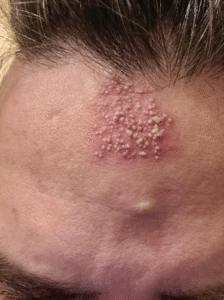These Are the Consequences of Sleeping with Makeup On
Sleeping with your makeup on might seem harmless after a long day or late night, but doing so regularly can have significant consequences for your skin’s health and appearance. Dermatologists and skincare experts agree that removing makeup before bed is one of the most important steps in any skincare routine. Here are the key consequences of sleeping with makeup on:
1. Clogged Pores and Breakouts
Makeup can trap dirt, oil, and dead skin cells in your pores. When left on overnight, these impurities stay on the skin’s surface and can sink deeper into the pores, leading to congestion. This increases the risk of blackheads, whiteheads, and acne. Foundation, concealer, and powders are particularly problematic, as they can mix with sebum and become a breeding ground for bacteria.
2. Premature Aging
Wearing makeup to bed can speed up the aging process. Throughout the day, your skin is exposed to environmental pollutants and free radicals, which stick to your makeup. If not removed, these substances cause oxidative stress, breaking down collagen and elastin—the proteins that keep skin firm and youthful. Over time, this can lead to fine lines, wrinkles, and sagging.
3. Dull, Uneven Skin Tone
Failing to cleanse your skin at night can cause dead skin cells to accumulate on the surface. This buildup leads to a dull complexion and uneven skin texture. Without proper nighttime care, your skin can’t renew itself efficiently, leaving you looking tired and lackluster in the morning.
4. Eye Irritation and Infections
Leaving on eye makeup, such as mascara, eyeliner, and eyeshadow, can cause irritation and serious eye problems. Mascara and eyeliner can flake into the eyes, causing redness, itching, or even infections like conjunctivitis. Hardened mascara can also clog the tiny hair follicles around your lashes, leading to inflammation or the development of styes.
5. Weakened Eyelashes
Mascara and eyeliner residue can make lashes stiff and brittle. This increases the likelihood of lash breakage and thinning over time. Healthy lashes need a clean environment to grow and thrive, and leaving makeup on overnight compromises their strength and longevity.
6. Dry and Dehydrated Skin
Many makeup products contain ingredients that can dry out your skin, especially if left on overnight. They can create a barrier that prevents your skin from absorbing moisture. As a result, you might wake up with dry patches, flakiness, or tightness. This is particularly problematic for those with already dry or sensitive skin.
7. Disruption of Skin’s Natural Repair Cycle
During sleep, your body enters a restorative mode, and your skin uses this time to repair itself from daily damage. Leaving makeup on can interfere with this natural process. Pores remain clogged, and skin cells can’t regenerate properly. Over time, this weakens your skin’s overall resilience and health.
8. Increased Risk of Allergic Reactions
Some makeup contains dyes, fragrances, and preservatives that can irritate the skin if left on too long. Prolonged exposure during sleep can increase your risk of developing contact dermatitis or sensitivity to certain ingredients. Even if you haven’t had a reaction before, your skin might react differently when exposed for extended periods.
9. More Pronounced Skin Conditions
If you suffer from conditions like rosacea, eczema, or acne, sleeping with makeup on can aggravate your symptoms. The chemicals and particles in makeup can cause flare-ups, redness, and additional discomfort. Consistent cleansing is crucial to keeping such conditions under control.
10. Pillow Contamination
When you sleep with makeup on, the residue rubs off on your pillowcase. Over time, your pillow becomes a hotspot for bacteria, oil, and product buildup, which can further contribute to breakouts and skin irritation. Even if you clean your face the next night, resting on a dirty pillow can undo your skincare efforts.
11. Loss of Natural Radiance
Over time, the cumulative effects of sleeping with makeup on can rob your skin of its natural glow. Skin that is constantly clogged, dry, and irritated doesn’t reflect light well. This leaves your complexion looking tired and unhealthy, even when you’re well-rested.
12. Staining and Fabric Damage
Makeup stains on your sheets and pillowcases are an aesthetic downside, but they also reflect the extent of skin exposure to leftover products. These stains can be difficult to remove, especially with long-wear foundations and lipsticks, and may lead to frequent replacements of bedding.
How to Prevent These Consequences
The best way to prevent these negative effects is to build a consistent nighttime skincare routine. It doesn’t have to be complex—just a few essential steps can go a long way:
- Use a gentle makeup remover or micellar water to break down makeup.
- Cleanse your skin with a mild facial cleanser to remove residue.
- Apply a moisturizer or night cream suited to your skin type.
- Use a separate eye makeup remover for waterproof or heavy products.
If you’re extremely tired, keep makeup wipes or micellar water and cotton pads by your bedside for a quick cleanup. While not ideal compared to a full cleanse, it’s better than doing nothing.
Conclusion
Sleeping with makeup on occasionally might not ruin your skin overnight, but doing it habitually can have long-term consequences. From clogged pores to premature aging, the risks are real—and avoidable. By taking just a few minutes each night to remove your makeup and care for your skin, you help maintain a healthy, radiant complexion and support your skin’s natural repair processes. Your future self—and your pillowcases—will thank you.


